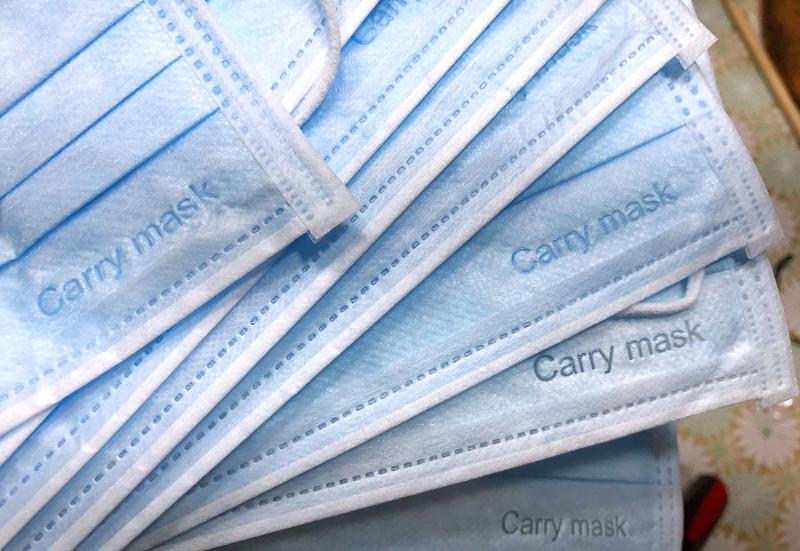A New Taipei City pharmacist reported that a shipment of masks from a local supplier contained more than 3 million that were made in China, the Food and Drug Administration (FDA) said yesterday.
The pharmacist in Sanchong District (三重), who spoke on condition of anonymity, said that one package was labeled with simplified Chinese characters that read: “Made in Anhui Province,” the FDA said.
The shipment was from Carry Hi-tech Co (加利科技) in New Taipei City’s Bali District (八里), it said.

Photo: Liu Hsin-de, Taipei Times
The FDA said that it collaborated with the New Taipei City Field Office of the Investigation Bureau and the New Taipei City Department of Health to conduct a search of the factory, where investigators found non-medical masks labeled as made in China and import documents.
Some of the masks bore the words “Carry mask,” which might have been an attempt to disguise where they were made, the FDA said.
The documents showed that the factory last month imported about 3.37 million non-medical masks and that they had been mixed with medical ones in the government’s rationing system, the FDA said.
The factory provides masks to pharmacies and public health centers in the city’s Bali, Linkou (林口), Lujhou (蘆洲), Sanchong, Sanzhi (三芝), Shihmen (石門), Sinjhuang (新莊), Taishan (泰山), Tamsui (淡水) and Wugu (五股) districts, it said.
Some shipments also went to Yilan County and Taipei, it added.
The factory has been shut down and barred from shipping any more masks, the FDA said, adding that the investigation would continue.
The company faces a fine of NT$30,000 to NT$2 million (US$1,016 to US$67,725), it said.
From today to Friday next week, people who have purchased masks with the words “carry mask” can exchange them for new ones at locations in the real-name mask registration system, it said.
The New Taipei City Consumer Protection Office said that pharmacies participating in the real-name registration system check the quantity and quality of masks to help avoid disputes.
The office said that it has ordered the city’s pharmacists and the New Taipei City Pharmacists’ Association to conduct thorough checks to keep problematic masks out of circulation.
Minister of Economic Affairs Wang Mei-hua (王美花) said that since the government’s mask-rationing system began allowing masks to sold without restrictions, it has kept close tabs on imports and exports.
“It is true that most of Taiwan’s imported masks come from China,” Wang said, adding that the Ministry of Economic Affairs would work closely with the Ministry of Health and Welfare to prevent suppliers from intentionally mixing Chinese-made masks with locally produced ones.
Speaking on the sidelines of an event yesterday, Minister of Health and Welfare Chen Shih-chung (陳時中) said that there is an ongoing probe into a similar case involving another mask supplier.
Chen did not name the company.
A potential solution is to label every locally made mask with “Made in Taiwan,” but further discussions are required, he said.
Additional reporting by Huang Hsin-po

Right-wing political scientist Laura Fernandez on Sunday won Costa Rica’s presidential election by a landslide, after promising to crack down on rising violence linked to the cocaine trade. Fernandez’s nearest rival, economist Alvaro Ramos, conceded defeat as results showed the ruling party far exceeding the threshold of 40 percent needed to avoid a runoff. With 94 percent of polling stations counted, the political heir of outgoing Costa Rican President Rodrigo Chaves had captured 48.3 percent of the vote compared with Ramos’ 33.4 percent, the Supreme Electoral Tribunal said. As soon as the first results were announced, members of Fernandez’s Sovereign People’s Party

EMERGING FIELDS: The Chinese president said that the two countries would explore cooperation in green technology, the digital economy and artificial intelligence Chinese President Xi Jinping (習近平) yesterday called for an “equal and orderly multipolar world” in the face of “unilateral bullying,” in an apparent jab at the US. Xi was speaking during talks in Beijing with Uruguayan President Yamandu Orsi, the first South American leader to visit China since US special forces captured then-Venezuelan president Nicolas Maduro last month — an operation that Beijing condemned as a violation of sovereignty. Orsi follows a slew of leaders to have visited China seeking to boost ties with the world’s second-largest economy to hedge against US President Donald Trump’s increasingly unpredictable administration. “The international situation is fraught

MORE RESPONSIBILITY: Draftees would be expected to fight alongside professional soldiers, likely requiring the transformation of some training brigades into combat units The armed forces are to start incorporating new conscripts into combined arms brigades this year to enhance combat readiness, the Executive Yuan’s latest policy report said. The new policy would affect Taiwanese men entering the military for their compulsory service, which was extended to one year under reforms by then-president Tsai Ing-wen (蔡英文) in 2022. The conscripts would be trained to operate machine guns, uncrewed aerial vehicles, anti-tank guided missile launchers and Stinger air defense systems, the report said, adding that the basic training would be lengthened to eight weeks. After basic training, conscripts would be sorted into infantry battalions that would take

GROWING AMBITIONS: The scale and tempo of the operations show that the Strait has become the core theater for China to expand its security interests, the report said Chinese military aircraft incursions around Taiwan have surged nearly 15-fold over the past five years, according to a report released yesterday by the Democratic Progressive Party’s (DPP) Department of China Affairs. Sorties in the Taiwan Strait were previously irregular, totaling 380 in 2020, but have since evolved into routine operations, the report showed. “This demonstrates that the Taiwan Strait has become both the starting point and testing ground for Beijing’s expansionist ambitions,” it said. Driven by military expansionism, China is systematically pursuing actions aimed at altering the regional “status quo,” the department said, adding that Taiwan represents the most critical link in China’s